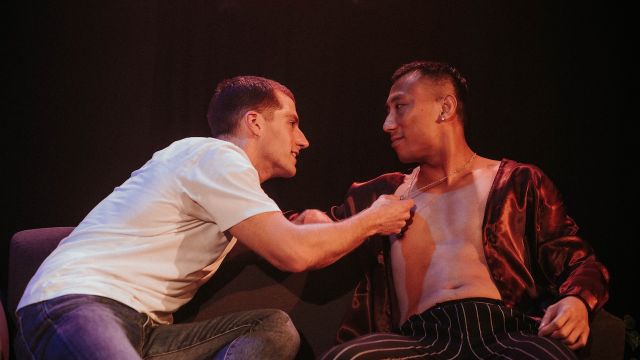cavemxn
It’s described as a ‘gay odyssey’ and indeed it is. The play follows its four characters across five years and three continents. Playwright Angus Cameron vividly creates four very different, distinct gay individuals, four character studies, and tracks them as they develop - or not - and change - or not. They all know each other - as much as they choose to be known - or know themselves. They fuck a lot - as if that’s de rigueur - an end in itself. We see them hook up, (in apartments, raves, an airport toilet, saunas and on the street), sniff coke, sniff amyl, drop ice, drop LSD, connect, collide, break up, switch partners, search for risk-free love and fail to find it, break hearts, including their own, and keep searching, searching…
The play is a fine example of the fact if you stick to detailed specifics, the depiction of the ‘gay party scene’ will look after itself. Tim (Patrick Livesey), an app designer, squirms his way to inner circle Liberal politics; Mike (Yuchen Wang) intelligent and self-aware, becomes a successful international DJ but describes himself as a ‘sex worker’; very pretty Oscar (Joss McLelland) floats about, insulated by his family’s wealth; and sad sack bear Chris (Harvey Zielinski) is an event organiser, talent developer and promoter. But the play scarcely goes into any of that. It focusses sharply on the characters’ fractured, sometimes desperate relationships and what else they do elsewhere exists only in plausible references - a boast, a confession, an indifferent fact.

The play’s story - which does not always look like a ‘story’ in the first half - proceeds in a series of short scenes in which dialogue can be abrasive, blunt, cruel, and competitive - the last as if each interlocutor must top the line before. That can be and often is funny, but also scarifying and revealing. It is - and it’s quite clear to the audience - attack as the best means of defence. Because these guys are into unwitting self-sabotage every time: to get what they think they might want risks rendering them exposed and vulnerable. So… There are many laughs throughout the performance, some simply at the distinctive gay wit and repartee, but just as often rueful recognition.
XaSha Chua-Huggins’ design provides for two all-purpose raised platforms and a curious scattering of large stones, as if reminding us of the atavistic nature of the behaviour on stage. Transitions between the many scenes can be awkward in the Chapel off Chapel Loft, but Harrie Hogan’s fluid lighting carries them - and Danni Esposito’s pop music choices take us directly into the milieu.

Despite being entertained and amused, my unfair impression of the play’s first half was that it was almost marking time or going in circles - and it was somewhat repetitious. But I was wrong: after a twenty-minute interval, we realise in the second half that the first has all been all skilful set-up - even if the characters - bar one - are still trapped within their carapaces of fear, delusion, and loneliness.
All performances are excellent. Livesey’s has that characteristic all body, manic-just-restrained energy - just watch their hands. Yuchen Wang brings heartbreak, weight and presence to Mike - and Harvey Zielinski’s Chris finds that a street wise intelligence doesn’t save him from bewildered pathos. Special mention must be made of Joss McLelland who, thanks to COVID, joined the cast very late and gives a fabulous performance as the preening, ruthlessly, irrationally selfish Oscar. His drag act - half bravura, half amateur - first up in the second half, gets a round of awed applause.

Curiously, however, despite these actors, despite the verbal fireworks and Bronwen Coleman’s excellent direction, the play remains somehow… cool. Such is its near objective analysis, one watches - that is, one feels for these characters but in an almost rational but not visceral way. The Companion did not share this reaction, so perhaps it’s just me.
The play - a world premiere - comes at the time of the anniversary of the first diagnosis of HIV/AIDS and of the decriminalisation of gay sex. The irony is there to be inferred: well, boys, now you’re free; what will you do with your freedom? On a broader level, the question of ‘what you will do with your freedom’ reaches out to the straight audience as well. Indeed, I’ve seen plays recently (not as good as this one) that deal with heterosexual evasion, self-protection, contrived excuses and, in the end, a preference for loneliness. Angus Taylor’s cavemxn is, despite its specificity, a fine play about being human now.
Michael Brindley
Footnote: cavemxn was shortlisted for the Red Stitch INK development program in 2015 but didn’t make it. Angus Cameron’s brief submission was at an early stage and the potential of his play was missed.
Photographer: Laura Du Ve
Subscribe to our E-Newsletter, buy our latest print edition or find a Performing Arts book at Book Nook.

